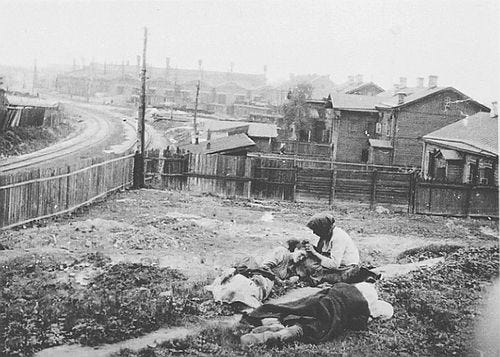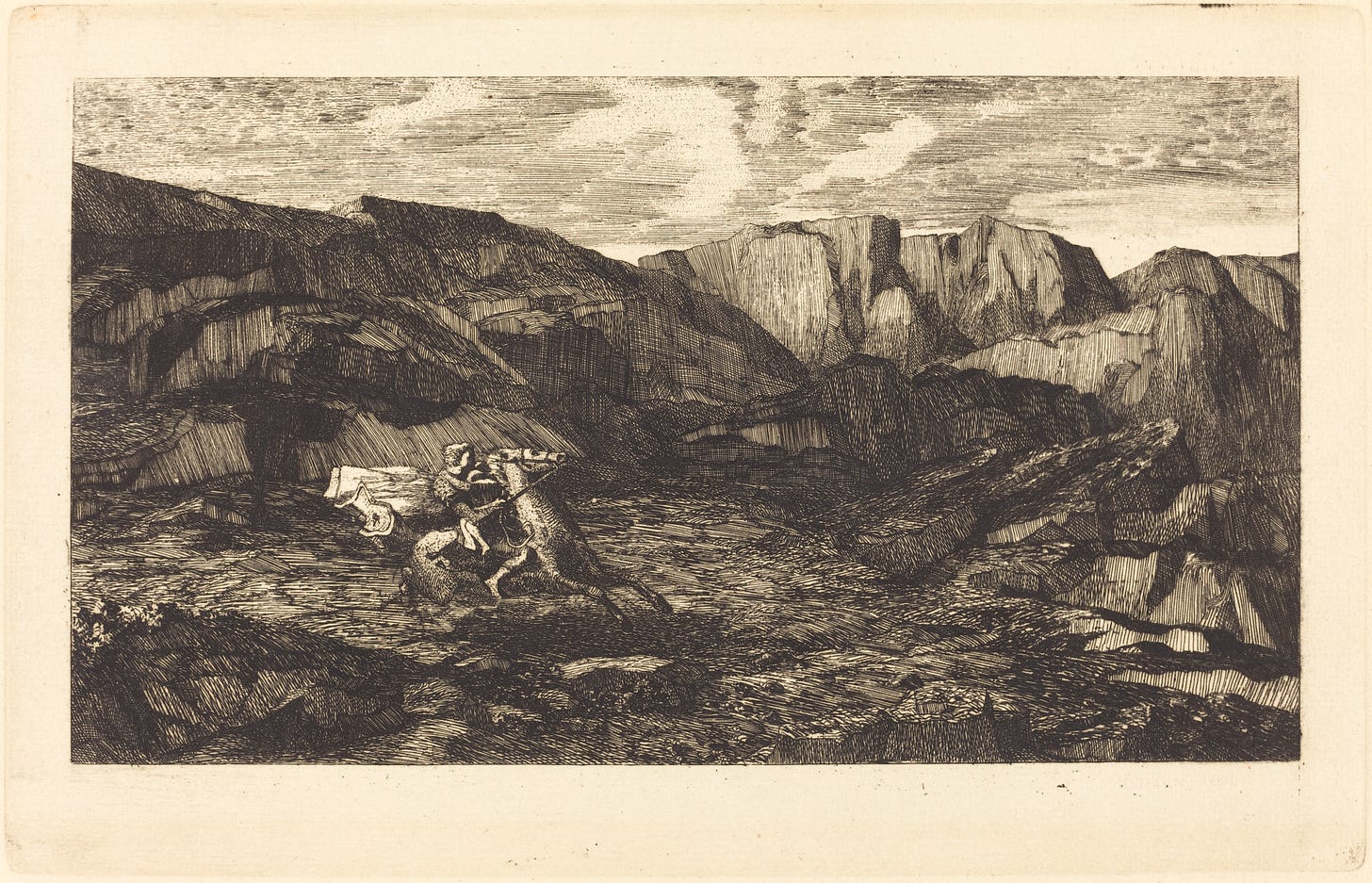Some Thoughts on Fear
My way of accepting the truth that every action is a possible version of reality not lived.
This post discusses how I have tried to navigate the uncertainty that comes with doing things—this includes making big life decisions. I also share my thoughts and experiences on healing my relationship with fear, trauma, and catastrophizing.
If you’re enjoying this newsletter, please consider becoming a paid subscriber. Right now, the annual subscription is only $24, that is only $2 dollars a month or .46 cents per post!
I’m afraid all the time. This is especially true in the context of decision-making. As soon as there’s a choice with broader implications on my life or the lives of others, my mind starts buzzing with fearful thoughts. What if this bad thing happens? Or this. Or this…infinity.
I know fear is rooted in trauma. I have lived through enough traumatic shit to know that there are plenty of reasons to be afraid. When bad things keep happening to you over and over and over again how can your mind or body not preemptively go into “protection” mode. Research on trauma suggests that survivors of war, abuse, genocide, or systemic oppression can transmit trauma to subsequent generations. This means that children and grandchildren can inherit not just the genes but also the epigenetic markers that might influence how they handle stress or trauma. Some people inherit property while others inherit trauma. I think many forget that inequity starts at the genetic level.
“The trauma reactions vary by generation but often include shame, increased anxiety and guilt, a heightened sense of vulnerability and helplessness, low self-esteem, depression, suicidality, substance abuse, dissociation, hypervigilance, intrusive thoughts, difficulty with relationships and attachment to others, difficulty in regulating aggression, and extreme reactivity to stress.”
from APA Dictionary of Psychology
What I know about my family history is the insane amount of trauma that my parents, grandparents, and great grandparents went through. Surviving holodomor (man made famine killing millions of Ukrainians in 1930 to 1933), pogrom (Soviet persecution and execution of Greeks in 1937), WWI, WWII, Soviet oppression, colonialism, mass persecution, poverty, gulags, German labor camps, Russian war, financial ruin, forceful deportations, illegal occupation, and much more.
Trauma aside. I know fear is an important survival tool. Humans (homo sapiens) have been using it successfully for over 150,000. It’s helpful because it prevents us from taking unnecessary risks or keeps us away from dangerous situations that could otherwise risk our survival. Fear activates our fight-or-flight-or-freeze response, helping us avoid harm. Our sympathetic nervous system (SNS) is responsible for putting our bodies into the fight-or-flight-or-freeze response, while the parasympathetic nervous system (PNS) is responsible for putting our bodies into relaxation and equilibrium after the initial stress response.
But what kind of life can one have when they are afraid all the time or are stuck in a perpetual fight-or-flight-or-freeze response? Instead of being able to enjoy our free time, we end up spending that time catastrophizing. It is also worth remembering that catastrophizing can keep the sympathetic nervous system (SNS) activated. Fearful thoughts can easily take over and stand in the way of fulfillment, joy, pleasure, relaxation, and a functioning parasympathetic nervous system that can regulate and calm the body.
A common coping strategy is to stay busy, as busy as humanly possible! Staying busy helps us turn off or at least tune out the fearful thoughts, ignore dealing with the chronic stress, and avoid addressing the real issue of restoring the function of our parasympathetic nervous system (PNS). Instead, it’s easier to distract yourself (your mind) with endless tasks, to do lists, work projects, activities, social events, etc. Using productivity to self-medicate doesn’t address the actual problem, the core is as raw as ever.
Once you finally have to stop being productive, usually due to exhaustion or fatigue, in other words our physical bodies are literally not able to continue to stay busy. We turn to a similar strategy of numbing or escapism by scrolling on social media, watching TV, reading, or “doing” leisurely activities that are actually just less active forms of staying busy (yes this does include baking.)
What’s the alternative? One alternative is to be still. To simply be. Sit there with your thoughts and the feelings that come with them. Allow yourself to feel the feelings. This, of course, means that you will start experiencing a general state of discomfort, even physical pain. This is best done with a professional therapist (preferably one that specializes in trauma or stress). For me, EMDR and CPT have been the most helpful. I talk about them in more detail in this post.
Until you address or learn how to regulate your nervous system to maintain emotional and physiological equilibrium, you might never be okay with being. The cycle remains unbroken. It means admitting things, sharing things, writing things, or talking about things that we haven’t for years. This work comes with a lot of difficult feelings and like I just said, discomfort. But being uncomfortable means addressing the real problem. It means doing the work that will improve your quality of life (both mentally and physically). It means a future where you can be still. Free of chronic stress and anxiety. Training our bodies or figuring out how to regulate our nervous systems without relying on our old coping mechanisms is incredibly hard. But by ignoring the core of the problem we are prolonging our lifelong state of discomfort.
Being afraid. Being afraid of. Being afraid of…fill in the blank.
I am not saying all fear, stress, or anxiety is bad. As I said earlier, all these things helped our ancestors survive. There are endless things in our current world to be afraid of. That goes without saying. Nor am I saying all feelings of fear, anxiety, or stress should be eliminated or reframed. A healthy dose of these can give us the right amount of adrenaline to get through a crisis, or motivation to perform better, or even help us create or make art.
I am tired of living in fear and I am finally able (to slowly) chip away at the layers of trauma (both mine and of my ancestors) that led me here.
The thing is. I want to take more risks. I want to be more comfortable with uncertainty. I want to be able to return to a state of equilibrium after a stress response. I also want to think positively (definitely not always but at least sometimes). To think, feel(!), and believe at some points in my life that things will work out. And to be able to better visualize a happy alternative reality, cultivate the opposite skill of catastrophizing. I am learning how to more realistically manage my future expectations without solely relying on the worse-case-scenarios in my mind.
What am I afraid of?
Everything! I have a long list of fears or maybe it’s more accurate to say a list of bad things that I am afraid of happening to me, my family, my people, or honestly the world. I’m in this strange constant state of being afraid that my life is going to get worse. That things are going to go wrong. Or that I will lose things that matter most to me; family, culture, stability, health, a place to live (or a place I can call home), ability to write and research, my community, ability to communicate, ability to provide, feed people, help, etc.
This is especially difficult given that I want to make some important changes in my life. I want to move. I want to work less. I want to spend more of my time writing, researching, developing recipes, and socializing (online and offline). I want to have more fun. I want to travel. Why then am I afraid of doing the things I say I want to do?
I think part of it has to do with being afraid that if I allow myself to do these things, I will start losing the things that are important to me. That I will somehow compromise all the things I worked so hard for.

It’s also very hard for me to do things for myself or to put my needs above others. This includes doing things that are meant to bring me joy. Doing things for myself has always been hard given that I grew up in an Eastern European household as the oldest daughter of conservative immigrant parents. I was always asked (expected) to put the needs of others above my own.
It’s also hard to deal with the fact that the few times I did put myself first something bad did end up happening. That’s of course how trauma works. It fools us into believing that we are responsible for something that we had absolutely zero control of. It’s an illusion of control that our minds create and latch on to make sense of traumatic experiences. We assign responsibility to ourselves as a way of trying to control or make sense of a nonsensical and uncontrollable event(s). I learned this in my CPT (cognitive processing therapy) program.
Do I actually have evidence to say that every time I do something for myself, bad things happen to those I love? No, I do not. Do I constantly have to remind myself of this fact? Yes, I do. At least for now.
Decision Making
I am in a place in my life when I have to make a lot of important decisions. Making decisions no matter how much research one does or how thorough you are comes with an element of uncertainty. Starting your own business comes with a lot of risk and unpredictability. Even the most sound business plan can end in financial ruin.
When do you know it’s the right time to make important life decisions? Be it personal, professional, familial, etc. How do you know when it’s time to leave your job? How do you know when it’s time to move? What if you have dependents? People that depend on you. How do you make these decisions for yourself while managing the implications your decisions might have on other people? How do I write about Ukrainian food and culture in a way that has the most impact and meaning?

If you are reading this post and thinking it’s all doom and gloom over here. Well, this is how some of us are. This is how some of us function. This is how difficult it is for some of us to live.
If you don’t have a safety net, especially in a society such as the one we have here in the US, making decisions can be especially paralyzing. Leaving your full-time job means losing access to healthcare, something that’s especially terrifying for those of us with chronic illnesses and disabilities.
While starting a business usually means going into debt. Deciding to pursue a graduate degree can also lead to financial instability for decades. All you have to do is simply log on to any social media to start feeling a sense of dread, or let’s be honest, open you eyes in the morning or close them at night.
I often feel torn between the smart or safe thing to do and the exciting or right thing for me to do. Those struggling with mental health, decision making can be especially difficult. The current literature recommends never making important decisions when under emotional duress or during an episode of depression. What if you are in a constant state of melancholy? Do you wait for moments of clarity or emotional regulation? That’s probably the best idea, but for some of us those moments are short and fleeting and sporadic.
I would love to know if any of my readers struggle with these things. Do you struggle with chronic fear? Do you struggle with positive visualization? Or do you have the ability to believe in a happy or good version of your future? Do you believe in yourself enough to know that you are making the right decision? Do you envision a life where good things happen to you and those you love?
To be completely honest, thinking positively was actively discouraged in my household. Thinking that good things will happen was a form of hubris and was a sure way to bring bad luck. It was best to prepare for the worst and be pleasantly surprised by the good. You can see how I was conditioned from childhood to depend on catastrophizing as a way to navigate the world.
Advice

Let’s do some quick role-play. Imagine I have a PhD student walking into my office articulating their fears of leaving their graduate program or considering professional options in industries other than academia. The fears alway come out first. For example, the student will express their fear of making the wrong decision. Let’s say in this case it’s leaving academia and being afraid that down the line they will regret making this decision. This fear assumes that whatever the PhD student decided to do turned out to be the wrong thing. We start imagining a future version of us that is regretting making the wrong decision. Is this how humans actually work? Research suggests that once you make a decision our brains have a way of convincing us that we in fact made the right decision. The trouble is actually in the options. The more options that we are presented with, the harder it is to make a decision. These options are all possible “alternative realities” of our future. In theory, of course.
Let’s unpack this a little bit. First, why are we so tempted to imagine an alternative where we made the wrong decision? This is rooted in catastrophizing as we saw earlier. What if we stopped talking about what could go wrong, or what the student is afraid of and shifted the conversation to understanding what the PhD student wants or what a fulfilling professional and personal life looks like for them. What were the reasons, the real why(s), that motivated them to pursue a PhD program in the first place? If it was to do research, or teach, what is it about that work that resonated with them? Teaching and research are not limited to academia, so what else do they value that brought them here?
We want to be as specific as possible. We want and need to understand the why(s). Where is this questioning of whether academia is right for them coming from? What would they miss about academia if they left? What do they value about academia? What do they find interesting about academia? What skills are they excited to use in academia? What is their ideal scenario in academia? What are their non-negotiables?
By focusing on figuring out what brings the PhD student professional and personal fulfillment, we first need to identify their values, interests, motivations, and things they enjoy doing (skills). There is usually a much bigger reason that motivates our interests and the types of things we want to do. Once we are able to articulate what those are. We can pivot and start thinking about the how. How can they do these things? What do they need to do to get there? Having a plan also helps deal with uncertainty and stress. But we can’t build a plan without doing the work of answering what’s important to us first and why!
Conclusion
As in the above example, I have been doing a lot of that very difficult inner work. Specifically thinking, reflecting, journaling, observing, paying attention as ways of figuring out what truly drives my work and life. Knowing my values has given me confidence and reassurance to make decisions that align with them. How can it be the wrong decision if my decision met the criteria of what’s important to me? It can’t.
Whatever follows that decision is no longer directly connected to the decision itself. Because as we all know and should remember, correlation does not equal causation. There are so many systemic and environmental forces at play that most things that happen to us are simply out of our control. This! This is the truth that is so hard for me (and many others) to accept.

I was never taught how to actually function in a world where things that happen to us are out of our control. Obviously there are caveats. The more capital (including social capital) one has the more control they have in our society, but even then you never know what will ultimately happen.
Those with financial safety nets have higher risk tolerance because knowing that you won’t end up homeless would surely help pretty much anyone feel more secure in their decisions. You can focus your attention on other things besides worst case scenarios. There are significantly fewer worst case scenarios to play out when you have a privilege of a safety net.
As we talked about earlier, personally, my mind, at least right now, is very good at focusing on “the bad things”. This is especially true when I have to do things that matter to me. As an example, if I am giving a presentation on a topic I am passionate about, thoughts like; I will mess up, I will look or sound stupid, I will make a mistake, I will get booed off stage, etc. I understand that this all comes from a deep rooted fear of what others think of me. My fear of letting people down goes back to developmental trauma, as does my fear of criticism.
Being perceived in a negative way is terrifying to me. Less so nowadays, because my fear of what people think of me has significantly less power over me nowadays. Honestly, this is another example of not having or being in control. We can’t control how others see us. Even if we do everything right, we might be perceived as bad or as not good enough. It’s you that has to believe that you and what you do is good enough.
Slowly, I am learning how to accept and live a life that’s lived for me instead of living a life driven by fear of what others will think or how it might make others feel. Being afraid of hurting others’ feelings, can often mean hurting our own. Because we are pretending to live. We are not living. I am continuing to work on caring less about what others think (I believe a healthy amount of caring about what others think is actually important for a healthy society).
Additionally, I am working on getting better at reframing fear as excitement. It’s like going to a mental gym. I started to “train” myself how to think about the things I have to do as a form of excitement instead of through the lens of fear. For example, I will notice a fearful thought about an upcoming task, and I will ask myself to restate the thought with excitement. For example, I will say things like; I am excited to see how this presentation goes, I am excited to find out how I perform, I am excited to see where things go, I am excited to try something new, I am excited to learn from this experience, etc.
This is my way of accepting the uncertainty that comes with doing things in our lives.
That’s what really matters.
Being able to live in a way that brings up feelings of excitement instead of fear.
BURNT BASQUE CHEESECAKE:
Orders through August 15th are now live!




We can find our inner compass in remaining still. Stillness in observing from moment to moment and breathing. Stillness in taking a breath and being aware of it. That may sound somewhat poetic but time teaches this. So much of your writing circles back to your upbringing and that is your journey. You recognize it. What I've learned is walking in the woods has allowed me to be still and to listen to my inner voice and develop a compass and to feel the earth under my feet.
So deeply relatable. For me, part of it also comes from growing up instilled with the idea that “if you do all these things you’re supposed to do, you will succeed.” And, of course (unfortunately), I’ve found that it’s just not the case. It’s hard to break free from that idea; it’s hard to not fall into thought spirals, trying to find what you did wrong to not end up where you were “supposed to” after doing everything you “should have.” It’s perpetuated in the work force, where I’ve always heard that I just need to stick it out a few more years to reach a point of stability. Meanwhile, my colleagues are still “sticking it out” 10+ years after they first got their positions. I’ve been dealing with a lot of ups and downs regarding my decisions, specifically with work, lately. So I feel you! Some days, I feel confident and strong, creative and hopeful. Other days (like today haha), I feel like it’s impossible to get out of this situation.